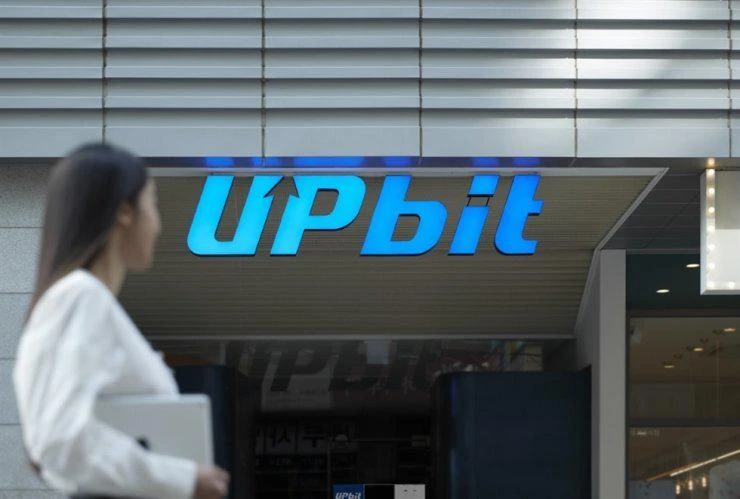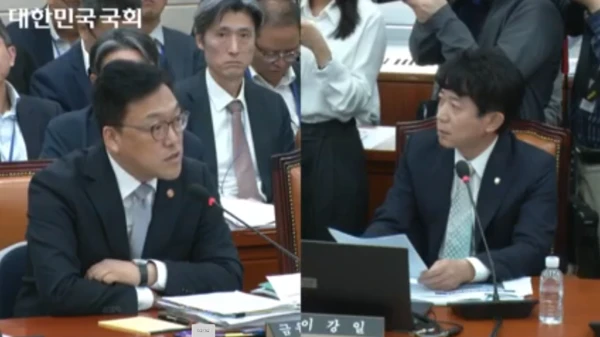La position de monopole potentielle d'Upbit remise en question en raison de sa relation étroite avec K Bank
Auteur original : Weilin, PANews

On October 11, according to Korean media reports, Upbit, South Korea’s largest cryptocurrency exchange by trading volume, is facing a market monopoly investigation by local financial regulators. Previously, Korean media have repeatedly reported on Upbit’s dominance in its domestic market, with a market share of more than 80%.
The background of this investigation is closely related to the initial public offering (IPO) application submitted by its partner digital bank K Bank in September. The development of the incident has aroused widespread attention to the close relationship between Upbit and K Bank.
Upbit accused of having too close a relationship with K Bank
Lee Kang-il, a member of the Democratic Party of Korea, raised questions about Upbit and its partner K Bank to Kim Byung-hwan, chairman of the Financial Services Commission (FSC), during the National Affairs Committee’s National Affairs Inspection on Oct. 10. Lee said that the top regulator “played the ‘squid game’ with local cryptocurrency exchanges,” allowing Upbit to thrive while sacrificing other competitors.
In response to this situation, he specifically mentioned that Upbit customers’ funds accounted for about 20% of K Bank’s deposits. He added: “If Upbit’s trading is interrupted, it will lead to a bank run at K Bank.” Lee Kang-il further emphasized that the close connection between Upbit and K Bank violated the principle of separation of industrial funds and financial banks, which was established to prevent industrial capital from exerting undue influence on banks.
Founded in 2017, K Bank is South Koreas first pure internet bank, initiated by 20 shareholders including Korea Telecom and Ant Financial. K Bank encountered financial difficulties in its early days and even had to suspend operations. However, over time, the bank gradually turned the situation around and began to make progress in its customer base and performance. In February this year, K Banks customer base reached 10 million, adding another million in just three months. Net profit in the first quarter set a record of 50.7 billion won, an increase of nearly 400% over last year. Currently, many Korean digital banks are profitable, and although another internet bank Kakao Bank has made the most headlines, K Bank has attracted more attention due to its unique business model.
Since 2021, K Bank has established an important partnership with Upbit. K Bank sought to apply for an IPO in 2022, but the plan was later canceled due to deteriorating market conditions. In September of this year, K Bank submitted an IPO application again in Seoul, expecting to raise up to US$732 million, which would be the largest public listing in South Korea in nearly three years. However, at the end of last year, given the risks posed by K Banks reliance on cryptocurrencies, South Korean lawmaker Kim Hee-gang said at the end of last year that at this time, it is not an exaggeration to say that K Bank has degenerated into Upbits private vault.
On October 10, lawmaker Lee Kang-il pointed out that by the end of 2023, about 70% of K Bank’s deposits were related to cryptocurrencies, which raised questions about K Bank’s business model. He said: “Is it reasonable for K-Bank, which has an annual profit margin of less than 1%, to offer 2.1% interest on Upbit customers’ custodial funds?” This unreasonably high interest rate not only raised concerns about K Bank’s profitability, but also raised doubts about its relationship with Upbit.

Lee Kang-il, a member of the Democratic Party of Korea, raised questions about Upbit’s “monopoly” position and its partner K Bank to Kim Byung-hwan, chairman of the Financial Services Commission (FSC), during the National Assembly’s State Affairs Committee’s national affairs inspection.
Squid Game-style regulation raises concerns
Lees remarks also led to a deeper reflection, as he compared South Koreas current regulatory situation to the previous international hit Korean drama Squid Game. The drama depicted an extreme situation in which participants would face death if they failed in the game, and he used this vivid metaphor to describe Upbits absolute control over the market. He said: Upbits cryptocurrency deposit trading commission accounts for more than 70% of the total industry. This actually makes it the undisputed leader of the industry. According to the Monopoly Regulation and Fair Trade Act, this makes Upbit a monopoly.
Lee further pointed out: “Upbit is the largest crypto exchange in South Korea and the second largest crypto exchange in the world. However, domestic exchanges active in the fiat and ‘cryptocurrency trading pairs’ markets are gradually dying out. This is because the crypto market here is too concentrated in the hands of one company.”
It is reported that Upbit, operated by Dunamu, was founded in 2017. The official website shows that the investment institutions behind Dunamu include Kakao, Kakao Ventures, Woori Technoloy Investment, Global Brain, Atinum Investment, Hanwha Investment Securities, HYBE, etc. According to CoinGecko data, Upbits daily trading volume is about US$1.2 billion. In September, the exchange received preliminary approval from the Monetary Authority of Singapore (MAS) for a major payment institution license. Upbit has reportedly established compliant branches in Indonesia and Thailand. Upbits success has provided it with more market control, which has also caused strong dissatisfaction among other competitors.
Lee Kang-il called on regulators to take steps to help domestic cryptocurrency exchanges in South Korea develop overseas expansion channels to enhance global competitiveness. He mentioned that the lack of effective connections with global exchanges and the strict regulation of the domestic market are impeding funds from overseas inflows. Trillions of won flow from domestic platforms to overseas exchanges every year, he concluded. But there is almost no money flowing in the opposite direction. This is a serious problem.
Regulators expected to launch antitrust investigation into Upbit
In response to Lee Kang-ils questioning, Kim Byung-hwan, chairman of the Financial Services Commission, said that the FSC will conduct a detailed review of K Banks IPO application. Kim Byung-hwan pointed out that the FSC is aware of Upbits potential monopoly issues and will investigate it. He added: We have implemented the Electronic Financial Transactions Act on September 15 and will check the relevant situation after the system is implemented.
In addition, Kim Byung-hwan also mentioned that the FSC plans to investigate the monopoly structure of the crypto market and Upbits market position based on Lee Kang-ils concerns.
As of now, despite the increasing reports of an investigation into Upbit, the exchange has not publicly responded to the matter. On October 10, Upbit Global notified users on the X platform that the exchange will temporarily suspend cryptocurrency withdrawal and deposit services during a planned server maintenance on October 14.
This is not the first time that South Korean lawmakers have accused Upbit of monopoly. In July this year, other members of the Democratic Party also expressed concerns about Upbits potential monopoly position.
As regulatory pressure caused by the close relationship between Upbit and K Bank continues to ferment, the cryptocurrency market in South Korea is facing certain challenges. Whether regulatory measures can effectively promote the healthy development of the market has become an important issue that all participants must face together.
This article is sourced from the internet: Upbit’s potential monopoly position questioned due to its close relationship with K Bank
En lien : Volatilité du BTC : revue hebdomadaire du 30 septembre au 7 octobre 2024
Indicateurs clés : (30 septembre, 16h, heure de Hong Kong -> 7 octobre, 16h, heure de Hong Kong) : Le prix du BTC/USD est stable ($63 500 -> $63 500), l'ETH/USD est en baisse de 4,6% ($2 600 -> $2 480) La volatilité ATM du BTC/USD en décembre (fin d'année) a diminué de 0,7 v (56,8 -> 56,1), et la volatilité du retournement de risque a diminué de 0,4 v (2,7 -> 2,3) le 25 décembre Aperçu des indicateurs techniques spot À long terme, la résistance du drapeau au sommet est trop forte pour être franchie - cela reste notre jugement de base sur les tendances du marché avant les élections américaines du mois prochain. Le rebond du BTC dans la fourchette $65-66k a été bloqué, et l'escalade de la situation géopolitique a fait chuter brièvement le prix en dessous du support précédent de la fourchette $60-61k, mais un support solide près de $60k a stabilisé le prix. Nous pensons que le…







